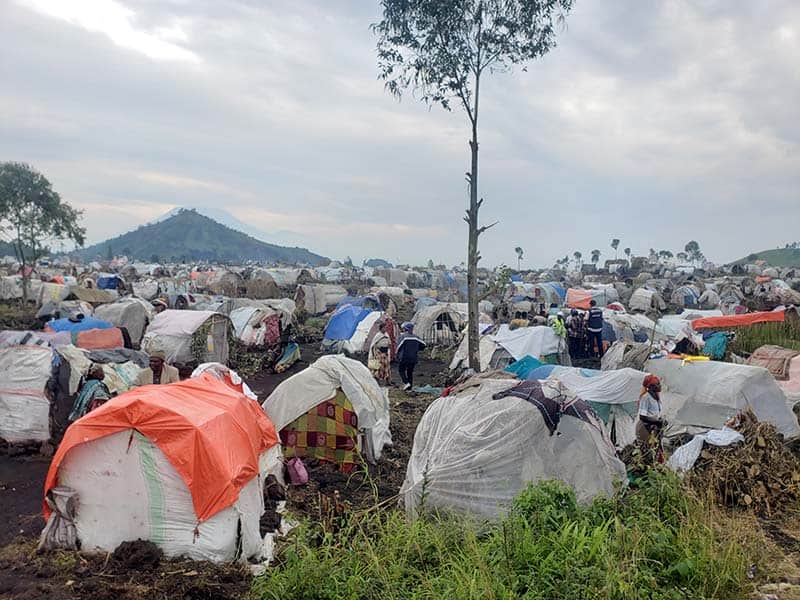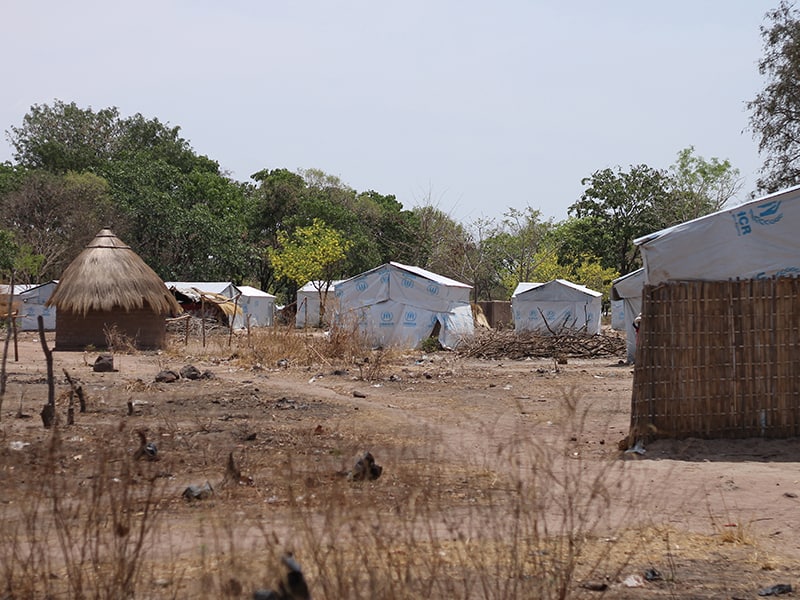For every global humanitarian crisis that makes major headlines, there are countless more that are rarely publicized. Around the world, people suffer daily from the effects of extreme poverty, violence, famine, displacement and more.
At World Relief, we know you care about the world and the people who live in it. We know you want to stay informed and live out God’s mandate “to love the least of these” and put your faith into action.
That’s why today, we’re talking about three of the lesser-known global humanitarian crises that are unfolding in the Democratic Republic of Congo, Sudan and South Sudan. Keep reading to learn what’s happening and how our staff are faithfully working to assist those most in need.
Conflict and Displacement in Eastern Democratic Republic of the Congo
DR Congo has long faced some of the most complex global humanitarian crises of our day. The country ranks 104th on the global food security index, and cycles of conflict and natural disasters have led to one of the most neglected displacement crises in the world.
Today, 6.2 million people in DR Congo are living as internally displaced.
In 2022, a new surge of conflict between DR Congo’s military and rebel group M23 further aggravated this crisis. The number of internally displaced people outside the city of Goma grew exponentially. Tents and tarps now cover the shores of Lake Kivu, housing the 500,000+ people who sought shelter in the lakefront IDP camps.
The situation in the camps is dire. Access to food, water, sanitation infrastructure and medical care is scarce; families are in need of essential household items like blankets, cookware and fabric; and the threat of violence continues to loom as M23 remains an active presence.

Displacement in Darfur
Since 2003, the people of Darfur have faced violent conflicts which have claimed the lives of more than 300,000 people and displaced over 2 million people, both internally and internationally.
In April 2023, heavy fighting broke out between two military forces in Sudan, sending the country into a deepening civil conflict. While the fighting started in Khartoum, it soon spread throughout the country causing food, fuel and water shortages which have particularly affected women, men and children living in Darfur.
The war has further fueled decades-old enmity between various ethnic groups and militias in the Darfur states over land disputes and political differences. This past June, the situation in West Darfur shifted from a political dispute to an ethnic conflict in which members of specific tribes have been targeted by the militia groups.
As a result, more than 329,000 people have fled across the border into Chad where they face hunger, thirst, exploitation and even death.
While the situation is especially dire in the Darfur states, it reflects just one part of a country-wide displacement crisis that has been caused by war, further limiting available assistance and resources. Throughout all of Sudan, 2.6 million people have been displaced internally, and over 700,000 refugees have fled the country.

Food Insecurity and Famine in South Sudan
Since gaining independence in 2011, South Sudan has struggled with ongoing civil conflict. This political instability has contributed to a food security crisis that is now being aggravated by increased flooding and climate instability.
Experts estimate that 7.7 million South Sudanese people are experiencing severe hunger and will be in need of humanitarian assistance in 2023. Since those estimates, conflict in Sudan has only increased the burden on resources in parts of South Sudan, as families fleeing conflict seek safety in South Sudan.
“The crisis in Sudan has triggered a lot of returnees* to South Sudan,” said Lihanda Jairus, Director of Grants Management and Business Development for World Relief South Sudan “The numbers of people arriving in South Sudan, their nutritional condition and the expected impact on food security cannot be ignored. The extra strain on existing resources will have a huge impact on available resources.”
*South Sudanese individuals who had been residing in Sudan.
How You’re Helping Us Respond
Though these humanitarian crises can seem intractable, we believe the love of God and the work of His people can bring about lasting change in each of these places.
At World Relief we’re adapting to these constantly changing circumstances and finding innovative ways to serve these communities through humanitarian assistance and life-saving interventions.
In DR Congo, we’re responding in the hardest hit regions near Goma by providing food and non-food items as well as hygiene and sanitation aid. In partnership with USAID, local church groups, leaders and other organizations, World Relief is identifying those facing the most acute hunger needs and prioritizing female-led households, people with disabilities and the elderly. We will reach 30,250 internally displaced people with monthly food distributions of beans, maize flour, rice, oil and salt, based on internationally-recognized standards for emergency nutritional needs.
In Darfur, Sudan, we are currently engaged in a cross-border response, assisting the men, women and children who are arriving in Chad by providing food, water and shelter. Although our office in Chad opened just earlier this year, our staff there have eagerly stepped in to assess the situation and respond. What’s more, we are resuming programming in Sudan as the security situation allows. Our local staff there are working hard to reopen health, nutrition and water and sanitation programs, as well as add shelter and protection programs to provide urgently needed relief to thousands of people who have lost access to the most basic services and necessities.
And in South Sudan, we are addressing food insecurity in Rubkona, Koch and Fangak through food distributions and agricultural training. We’re distributing crop kits to more than 18,000 households and fishing kits to 6,000 households in Fangak and Koch. What’s more, 15,932 people in Koch and Rukona will be reached with therapeutic food services, and more than 75,000 children under 5 will receive nutritional assistance.
Providing life-saving assistance during an emergency is just one way we get to be the hands and feet of Jesus. Our response to humanitarian crises should be marked by love, empathy and a commitment to meet immediate needs and address the root causes of vulnerability with care and creativity.
You can join us as we respond to global humanitarian crises by praying for our brothers and sisters who are suffering and by giving today. May we all see the hand of God at work, even in the darkest moments.

Amanda Patterson serves as World Relief’s Humanitarian and Disaster Response Unit Program Officer in DR Congo and South Sudan. Prior to joining World Relief, Amanda worked overseas as a humanitarian responder to refugee and conflict emergencies in Niger, South Sudan, Greece and Ethiopia with a large Christian NGO. She is passionate about helping others experience the beauty and diversity of God’s creation through art, nature and cultural engagement.


